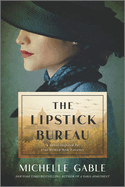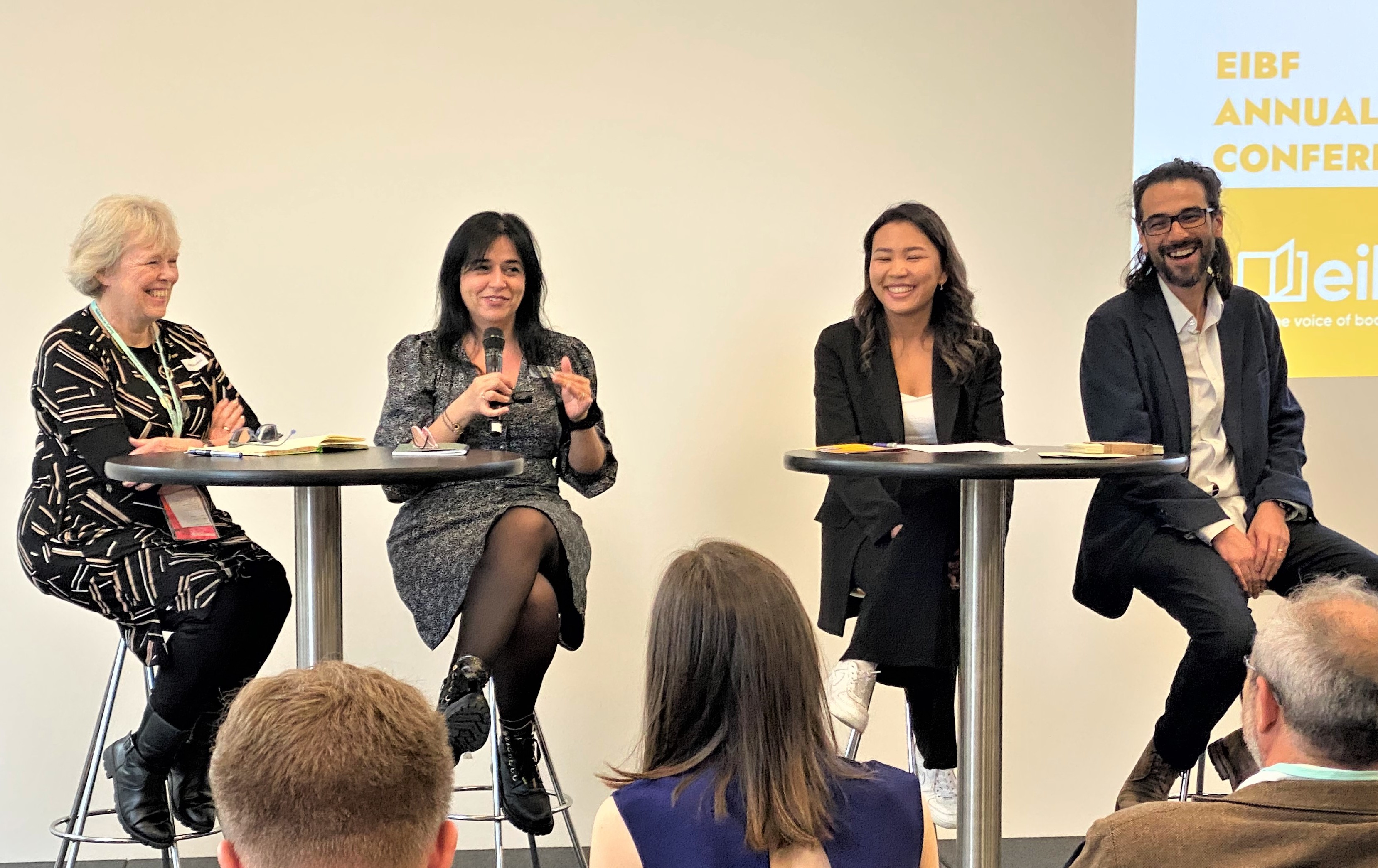 |
| Moderator Hazel Broadfoot, Village Books, Dulwich, England, and president of the BA; Katerina Malakate, Booktalks, Athens, Greece; Aidai Maksatbekova, IQ Bookstore, Bishkek, Kyrgyzstan; João Varella, Sala Tatuí and Banca Tatuí, São Paulo, Brazil. |
During the European & International Booksellers Federation conference at the Frankfurt Book Fair last month, three booksellers from around the globe discussed their stores, trends, challenges and more. The roundtable Bookselling: A World Tour was moderated by Hazel Broadbent, owner of Village Books, Dulwich, England, and president of the Booksellers Association of the U.K. and Ireland.
In 2019, Aidai Maksatbekova founded IQ Bookstore, the only English-language bookstore in Kyrgyzstan, the former Soviet Republic in Central Asia. The store, located in the capital of Bishkek, began online, after Maksatbekova found it almost impossible to find English-language and other foreign language books in Kyrgyzstan, a country of seven million people whose official languages are Kyrgyz and Russian.
 |
| Aidai Maksatbekova |
The bookselling challenges are striking. Only about 0.2% of the population is fluent in English (60,000-70,000 people), and the country's GDP per capita is just $1,200, making books for $15 "a luxury." There is also "a lack of reader culture" in the country, Maksatbekova said. "When the Soviet Union collapsed," she explained, "people stopped reading in order to feed themselves."
In addition, because Kyrgyzstan is landlocked, the supply chain is "very expensive." As in many places, prices for many kinds of goods have risen, and all paper is imported from Russia, which, not surprisingly has been a problem this year, resulting in paper prices increasing by 40%. There also are few translators in Kyrgyzstan in part because the government hasn't supported translators or publishers, but "the tables are turning," and people are starting to read more, and some books in English are being translated into Kyrgyz.
At first, IQ Bookstore was an online-only shop, which Maksatbekova promoted heavily on social media. The store become popular "in a short time because it's unusual." Also, "many people from TikTok" were drawn to it. Early this year, Maksatbekova opened a bricks-and-mortar location and offers more than 5,000 books.
Maksatbekova's main mission, she said, is "to make English and other foreign languages available in Kyrgyzstan and increase the number of people who speak foreign languages." She called this "very important for my country."
---
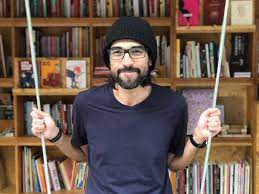 |
| João Varella |
João Varella is a bookseller, publisher, book fair organizer, author and journalist who founded the Brazilian publishing house Lote 42 and the bookstores Sala Tatuí and Banca Tatuí, both in São Paulo.
Varella started Lote 42 10 years ago and publishes a variety of genres, including fiction, nonfiction, comics/graphic novels and poetry, all of which have striking graphic design elements, drawing on Varella's background in visual arts and literature. (As an example, he showed a copy of Queria Ter Ficado Mais, which features chapters by 12 authors about different cities in the world. Each chapter is in the form of a letter in an envelope that must be pulled out and opened to be read.) Varella emphasized that the house is part of the independent publishing scene in Brazil that is creating a "different kind of reading experience."
To expand on that experience, Varella realized, he said, that he needed "a physical space where people could discover and buy these kinds of publications" on a regular basis, not just at book fairs. Because rent is expensive in São Paulo, he started by transforming a newsstand into a bookstore and now has two stores. One has some 600 books and zines by a range of independent publishers and the other is a space for courses and bookselling by appointment.
Varella noted that he plans to start a small print shop and do small print runs. He recalled that there's a long tradition of booksellers, publishers and printers "all being the same person." He suggested the book world "look backward to that," calling it "the future of bookselling."
Brazil shares the common current problems of inflation and problems involving paper, he continued. Brazil manufactures and exports paper, but paper prices in the country have increased a lot. Recently many bookstore chains in Brazil have gone bankrupt and "turned the market upside down." Most of the bestselling titles in Brazil are translations from abroad, and Varella said that if there were more "Brazilian voices," it would help a book ecosystem grow in the country. This is another reason that he focuses on selling books from independent Brazilian publishers.
He also noted that shipping books abroad is difficult for Brazilian publishers and booksellers because of Brazilian customs, so much so that whenever he travels abroad, he brings books in his luggage: "That's how we deliver."
---
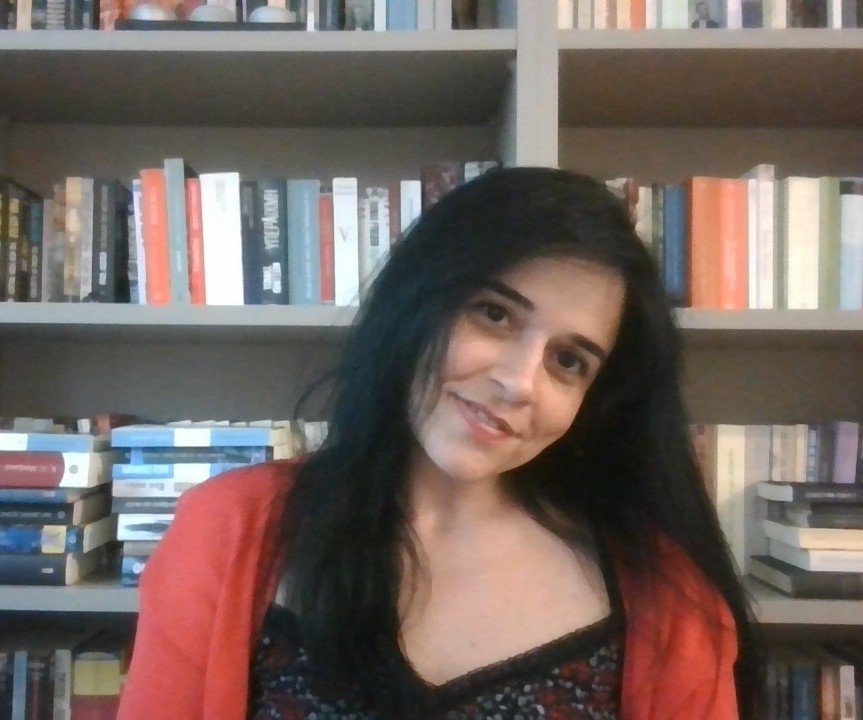 |
| Katerina Malakate |
Katerina Malakate opened Booktalks, a bookstore and cafe, in Athens, Greece, 10 years ago. An author, book blogger and vice president of PEN Greece, Malakate wanted to boost book culture in the country and has emphasized creating deep, loyal relationships with customers. The store offers many literary events, two workshops focused on creative writing and reading, and two book clubs that are free if participants buy the books. The clubs are conducted in person and via Zoom because they attract many Greek emigres. She emphasized that the store doesn't just sell books, "we curate books, we recommend books."
During the pandemic, sales boomed at Booktalks because of the store's strong social media presence, allowing even more communication with customers, and because the store was able to supply books in one to two days while competitors weren't able to. "It was an opportunity, and we took it." As a result, sales for the store are now 50/50 in person and online. She observed that there are "two faces" in e-commerce: customers who are "anonymous" want titles immediately while others who chat are "a different story."
She noted that Greece has a population of "only nine million" while the store has some 130,000 Facebook followers, who "create content," talking about books and recommending books. Malakate herself has blogged about books since 2009, reading about 120 a year, which has translated well into social media as blogging has become less popular. Events, workshops and book clubs are always busy because Booktalks customers "want to read and want to write, which is why they're in a bookstore."
This all resonates because, Malakate said, Greece has "no reading culture," in part because there are "no libraries." Although most books published in Greece are of high quality--and few paperbacks appear--Greek publishing is limited to one edition since average sales are 3,000 copies per book. Imported titles are usually paperbacks, which by comparison are "like the small children of our books." About 80%-90% of the books are translations, and the author community is very small. "We have to open up the Greek book community," she said. "We have to have more original titles in Greek. We need more Greek authors."
Like other countries, Greece has been affected by the Russian attack against Ukraine. "We had imported all paper from Russia," Malakate said. "Now we have to go elsewhere." Book prices have risen a euro or two recently (about a dollar or two), but since the economic crisis in Greece 10 years ago, book prices had gone down and stayed down for a long time.
Still, Malakate is optimistic about the future, she said, in large part because of the shift in sales online and the growth of social media, which has expanded her customer base, making the store a hybrid model. Printed books are still key. "It's the best technology to read," she said. "If it weren't, I wouldn't be here." --John Mutter
 Hidden Nook Booksellers, a general-interest bookstore with about 800 square feet of selling space, has opened for business in Grayling, Mich. Owners Rae and Liam Gosling opened their doors on Saturday, October 29, and carry new titles for children, teens and adults.
Hidden Nook Booksellers, a general-interest bookstore with about 800 square feet of selling space, has opened for business in Grayling, Mich. Owners Rae and Liam Gosling opened their doors on Saturday, October 29, and carry new titles for children, teens and adults. The bookstore's sideline offerings include literary-inspired gifts, bookmarks, book lights and totes, as well as "handcrafted treats" like chocolates and lollipops. Hidden Nook Booksellers also carries board games, which Rae Gosling described as their "other passion" aside from books. Customers won't find Monopoly or Clue but rather some modern classics like Ticket to Ride and other European-style games, sourced from companies such as Asmodee and "not usually found in Target."
The bookstore's sideline offerings include literary-inspired gifts, bookmarks, book lights and totes, as well as "handcrafted treats" like chocolates and lollipops. Hidden Nook Booksellers also carries board games, which Rae Gosling described as their "other passion" aside from books. Customers won't find Monopoly or Clue but rather some modern classics like Ticket to Ride and other European-style games, sourced from companies such as Asmodee and "not usually found in Target."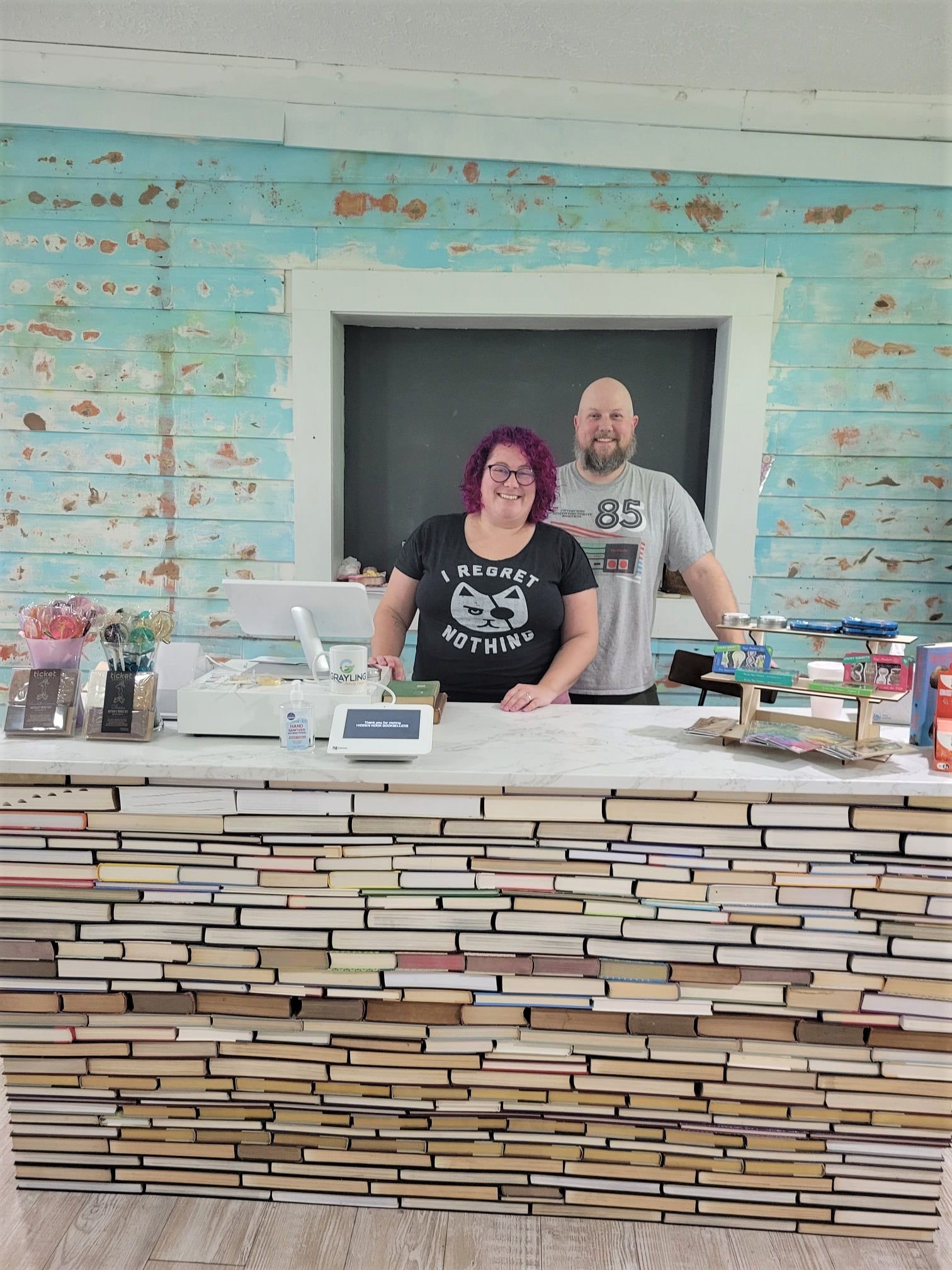











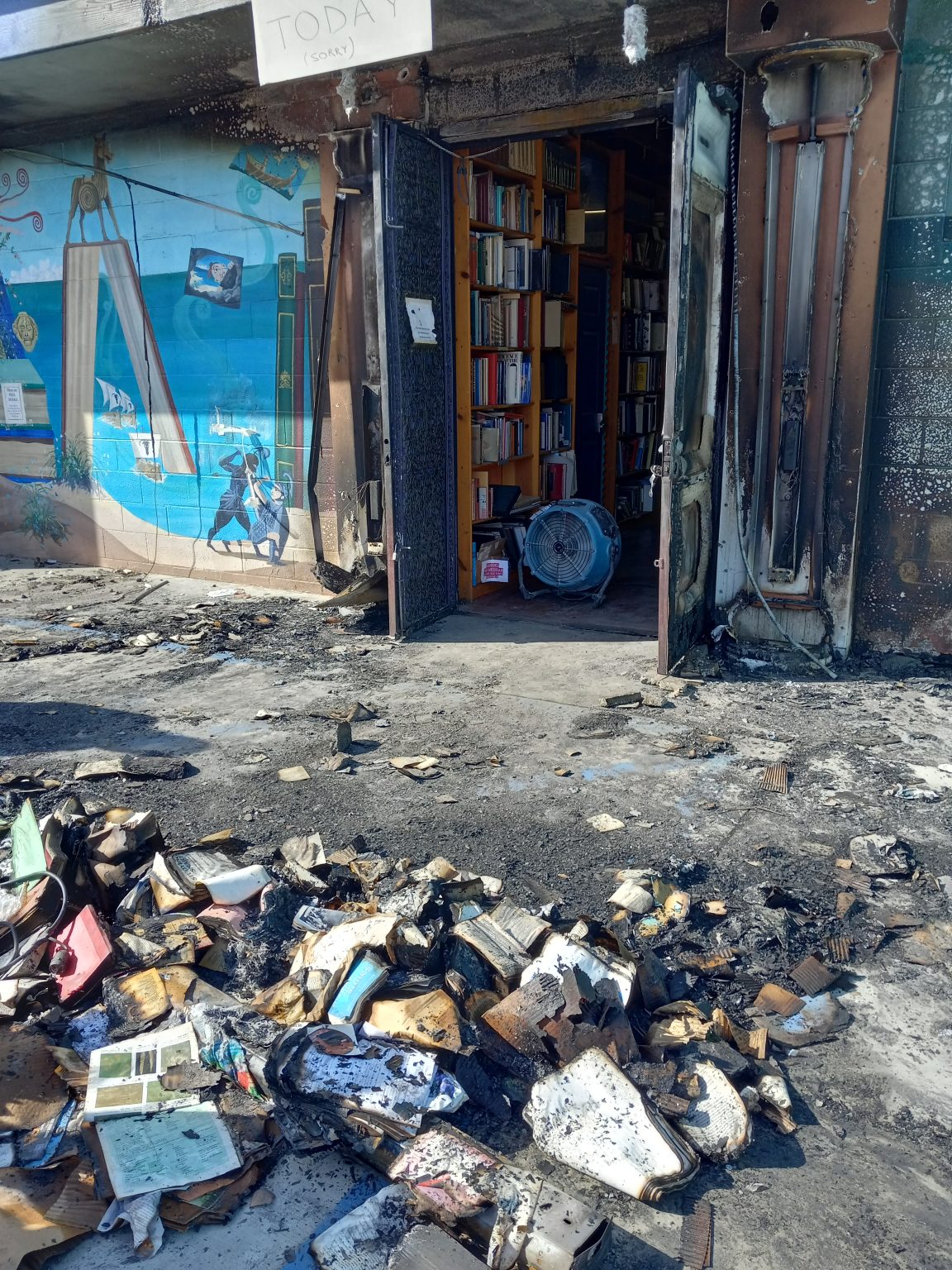





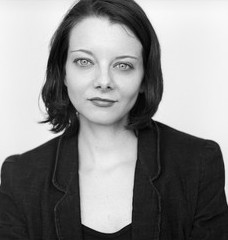
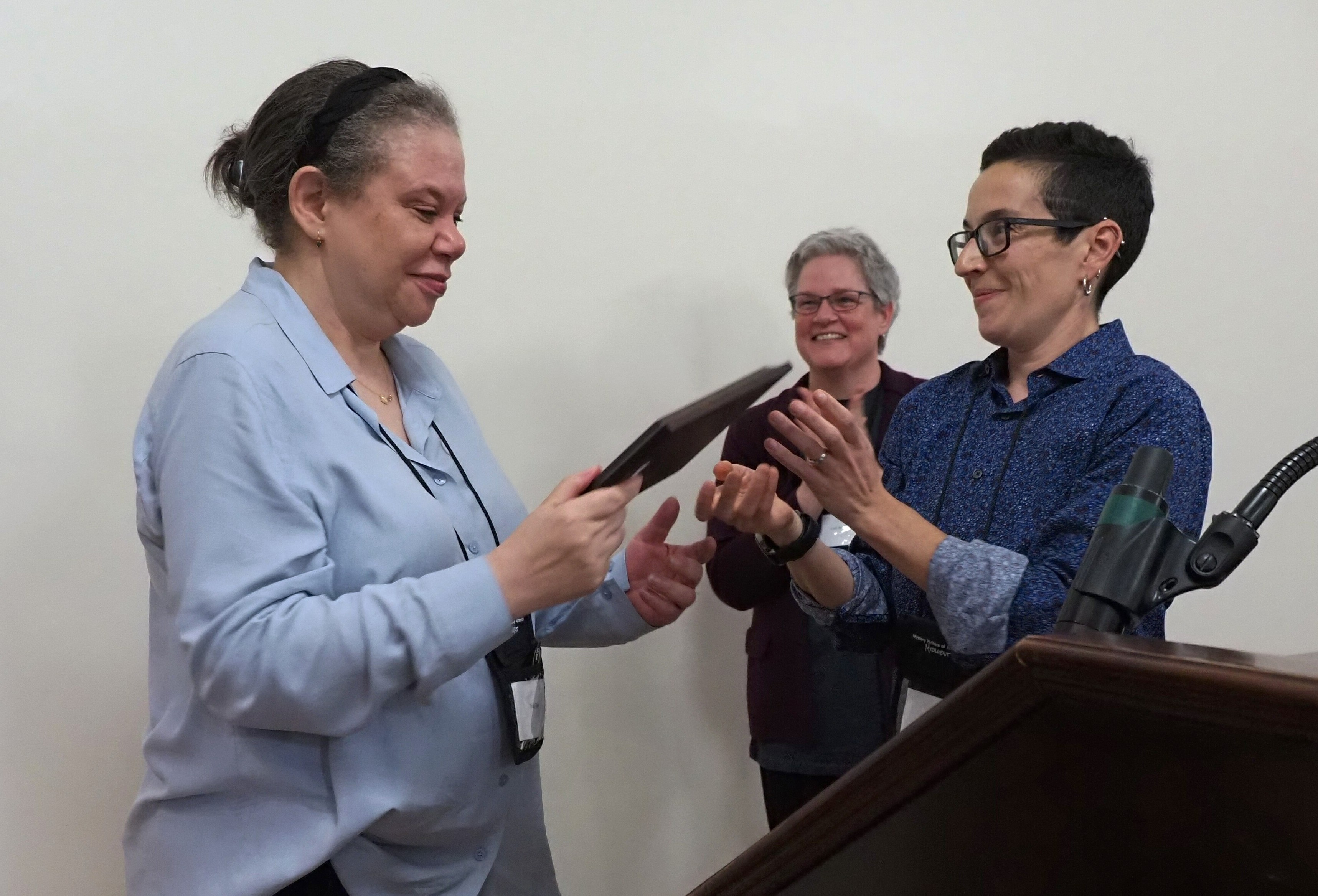 Tracy Clark, author of the Chicago Mystery Series and the upcoming Harriet Foster Detective Series, received the Paretsky Award honoring mysteries set in the Midwest. The award was presented at the Midwest Mystery Conference on November 5 by conference co-chairs mystery author Lori Rader-Day (center) and Dana Kaye (Kaye Publicity; r.).
Tracy Clark, author of the Chicago Mystery Series and the upcoming Harriet Foster Detective Series, received the Paretsky Award honoring mysteries set in the Midwest. The award was presented at the Midwest Mystery Conference on November 5 by conference co-chairs mystery author Lori Rader-Day (center) and Dana Kaye (Kaye Publicity; r.).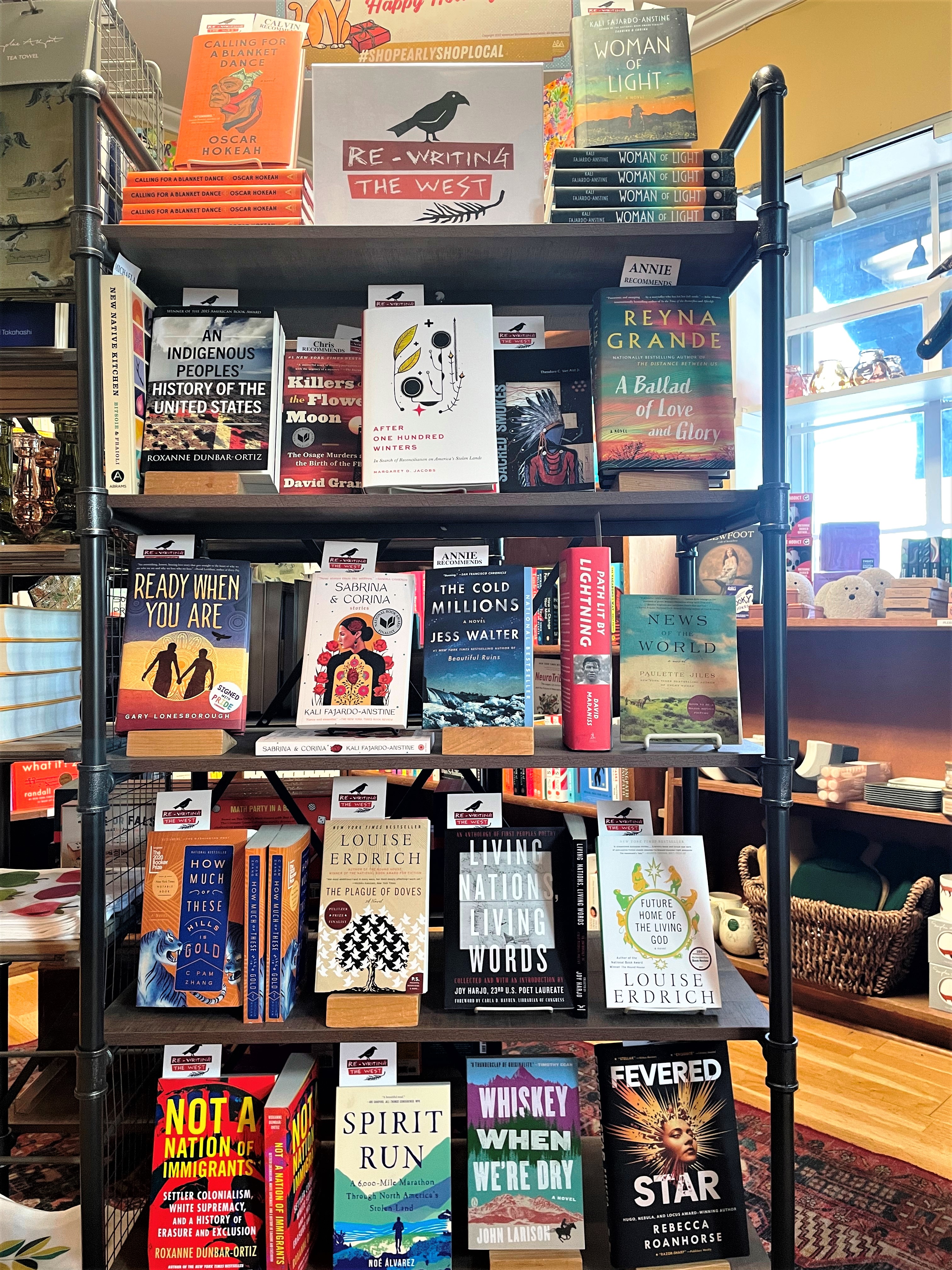
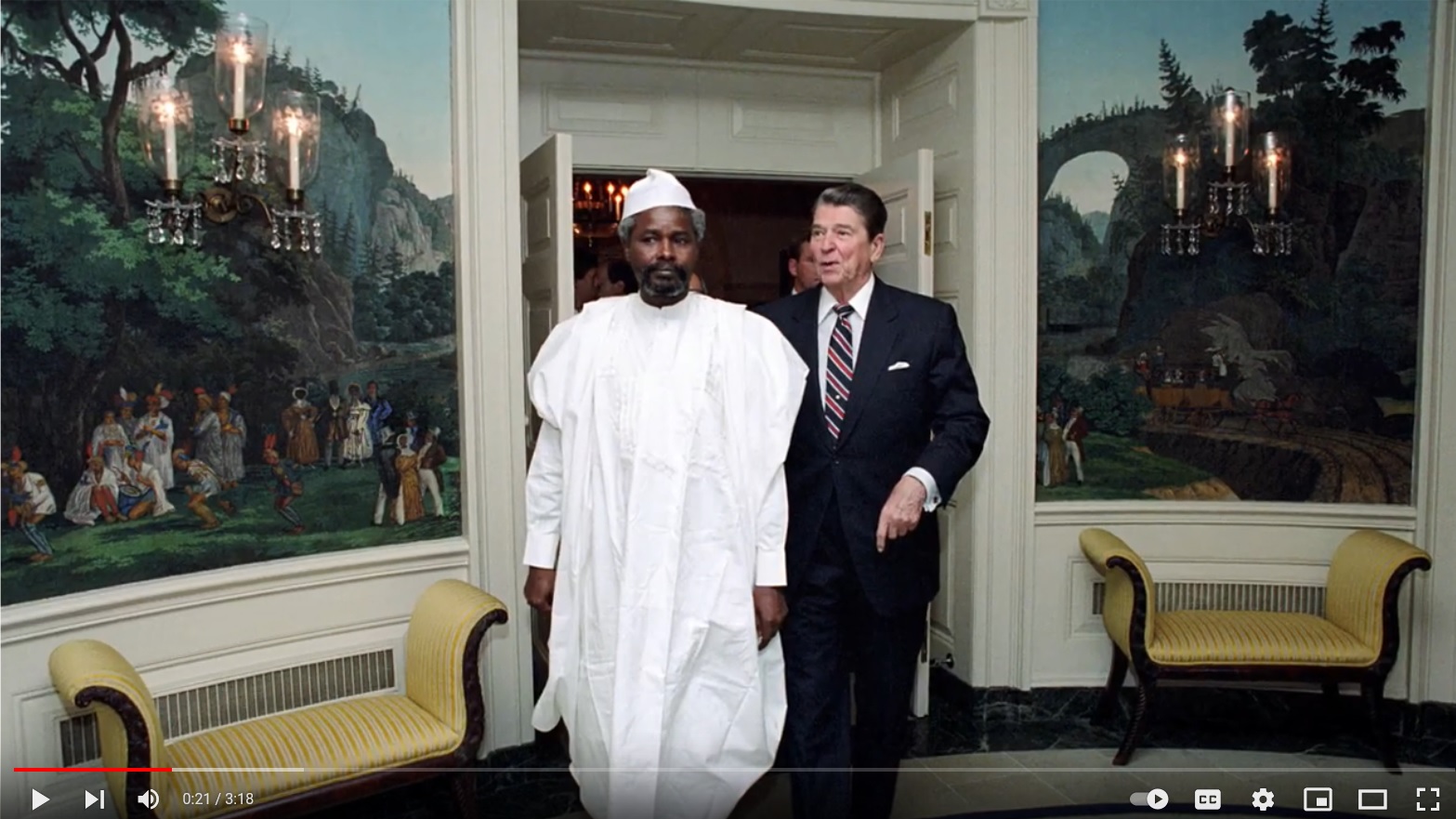 To Catch a Dictator
To Catch a Dictator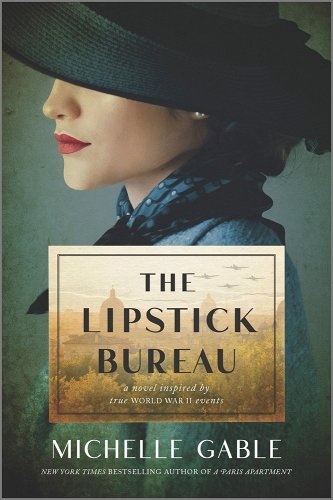 As World War II drags on, Czech American lawyer and journalist Nikola "Niki" Novotná is recruited to the Office of Strategic Services. Disappointed at first by her new assignment, Niki nonetheless comes to relish her role in Morale Operations. Michelle Gable (The Bookseller's Secret;
As World War II drags on, Czech American lawyer and journalist Nikola "Niki" Novotná is recruited to the Office of Strategic Services. Disappointed at first by her new assignment, Niki nonetheless comes to relish her role in Morale Operations. Michelle Gable (The Bookseller's Secret; 